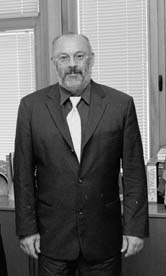Personal tools
News from ICTP 98 - Commentary

UNESCO's new head of science talks about the wide-ranging activities of UNESCO's Natural Sciences Sector and the central role basic science plays in the sector's mandate.
Science at UNESCO
The United Nations Educational,
Scientific and Cultural Organization (UNESCO) Natural Sciences
Sector, ICTP's most direct link to UNESCO, works with partners
worldwide to promote science and technology.
The Natural Sciences Sector seeks to advance its broad mandate
through a variety of programmes, including the:
- Intergovernmental Oceanographic Commission (IOC).
- Man and Biosphere (MAB) Programme.
- International Geological Correlation Programme (IGCP).
- International Hydrological Programme (IHP).
- Environment and Development in Coastal Regions and in Small
Islands (CSI) Platform.
In addition, the sector promotes efforts in renewable energies,
particularly solar energy, through its participation in the World
Solar Programme 1996-2005, and helps to forge university-industry-science
partnerships through the UNISPAR programme. UNESCO's Natural Sciences
Sector also recognises scientific and technological achievement
through its sponsorship of a host of prizes and awards. And the
sector participates in a variety of programmes designed to explore
specific science policy issues ranging from scientific ethics
to strategies for combatting AIDS and malaria.
Our broad portfolio of activities shares a common set of strategies
and goals to:
- Advance scientific research and the transfer of technology through
partnerships with local, regional, national and international
institutions.
- Build scientific and technical capacities in a variety of fields
of importance to the social and economic well-being of our member
states.
- Focus particular attention on the needs of the developing world.
The relationship between the Natural Sciences Sector and ICTP
is defined by the sector's overarching strategies and goals. While
the sector and the member states that we serve are interested
in the application of science and technology to solve real-world
problems, we recognise that training and research in the basic
sciences provide the 'critical' thinking and technical skills
necessary for devising sustainable science-based development strategies.
In short, we believe that each nation's ability to develop the
basic sciences--and to nurture a critical mass of physicists,
chemists and biologists--is a key aspect of capacity building
and should not be ignored even among nations with pressing economic
and social needs.
Walter Erdelen
When I visited ICTP last July for the first time since becoming
assistant director general for the Natural Sciences Sector, I
had already been informed about the Centre's internationally acclaimed
role as a training centre for scientists from the developing world.
What impressed me during my brief visit to Trieste was not only
the lively educational environment that pervaded the ICTP campus
but the commitment of ICTP's scientific staff to research excellence--not
just in the Centre's traditional fields of high energy physics,
condensed matter physics and mathematics, but in such related
fields as physics of weather and climate, seismology, and the
modelling and simulation of complex realities, all of which have
been launched and expanded in recent years.
Both the training and research aspects of ICTP fit well with the
Natural Sciences Sector's efforts to promote education in the
basic sciences and to contribute to strategies for science-based
sustainable development, especially in the developing world. The
work of ICTP speaks to our sector's--indeed all of UNESCO's--special
interest in the least developed countries, particularly countries
in sub-Saharan Africa.
My staff and I look forward to working closely with ICTP's staff
in forging a stronger partnership that highlights the important
role that basic science plays in UNESCO's overall mandate. I believe
that the Centre has a great deal to contribute to UNESCO's Natural
Sciences Sector by offering new ways of thinking about old, intractable
problems dealing with the relationship of science to society.
I hope to invite ICTP senior staff to Paris to share their thoughts
with us in the near future. This is all part of a larger strategy
within the sector to strengthen and renew the sense of belonging
and exchange within our own family of institutions.
For more detailed information about UNESCO's Natural Sciences
Sector, please visit its website at www.unesco.org/science/ or email w.erdelen@unesco.org.
Walter Erdelen
Assistant Director General for Natural Sciences
United Nations Educational, Scientific and Cultural Organization
(UNESCO),
Paris, France
